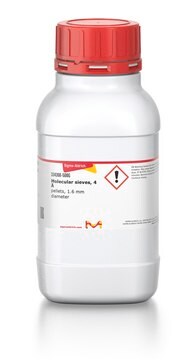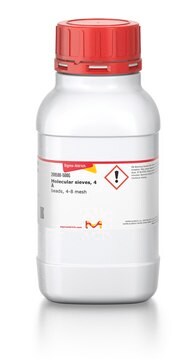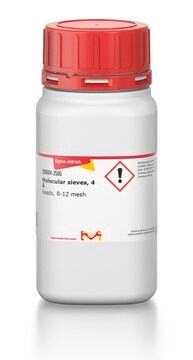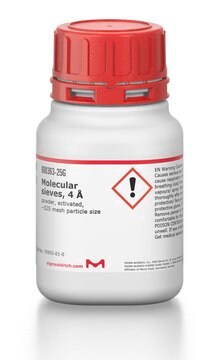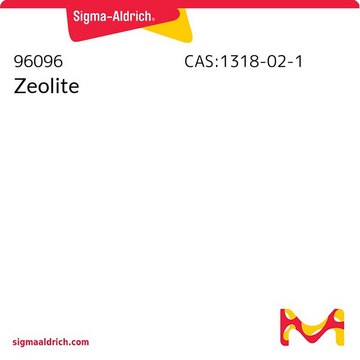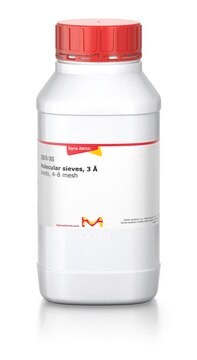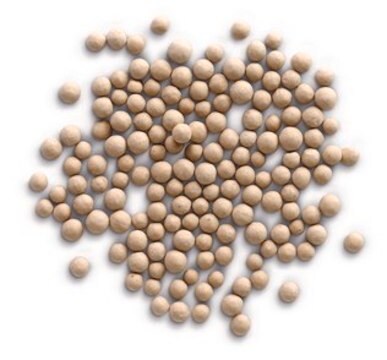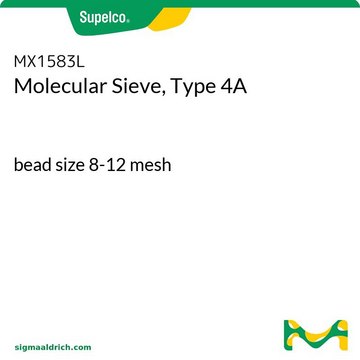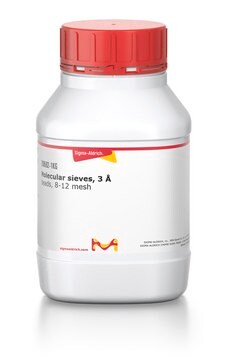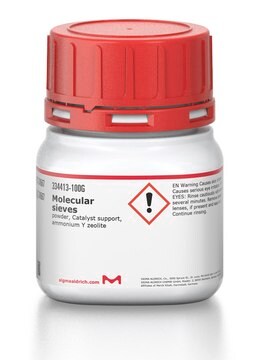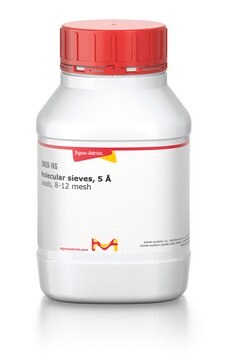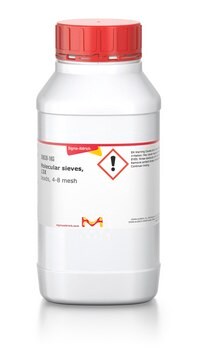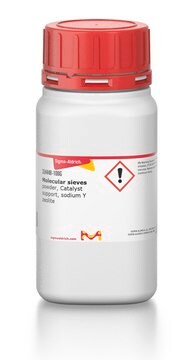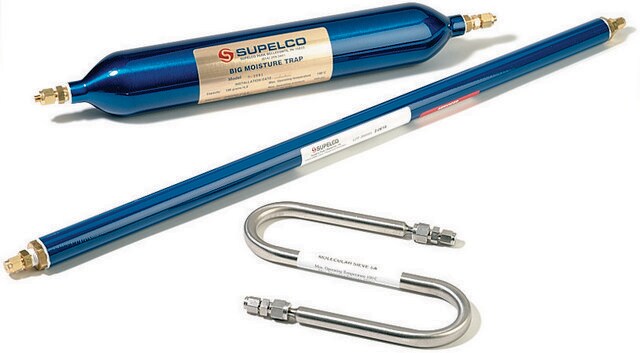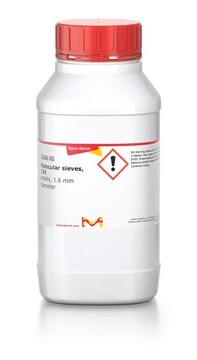334294
Molecular sieves, 4 Å
pellets, 3.2 mm diameter
Iniciar sesiónpara Ver la Fijación de precios por contrato y de la organización
About This Item
Fórmula lineal:
Na12[(AlO2)12(SiO2)12] · xH2O
Número de CAS:
MDL number:
UNSPSC Code:
23201100
eCl@ss:
32110204
NACRES:
NA.21
Productos recomendados
¿Está buscando productos similares? Visita Guía de comparación de productos
Categorías relacionadas
General description
Choosing a Molecular Sieve:
1. The preferential adsorption of one molecule over another depends upon pore diameter and mesh size.
2. The dynamic capacity of the silica gel for adsorbing a particular compound is governed by the internal surface area; the greater the surface area, the greater the dynamic capacity.
3. Rate of adsorption and sharpness of resolution are dependent chiefly on particle size and column packing; a fine particle size gives optimum sharpness of resolution.
4. Liquids are most readily adsorbed from solvents in which they are least soluble; a good solvent makes a good desorbing agent.
5. Highly polar liquids are readily adsorbed. Compounds having hydroxyl groups, or containing oxygen are strongly adsorbed.
6. For similar compounds, the higher the molecular weight the higher the selectivity.
7. For hydrocarbons of similar molecular weight, adsorptivity increases with the number of double bonds.
1. The preferential adsorption of one molecule over another depends upon pore diameter and mesh size.
2. The dynamic capacity of the silica gel for adsorbing a particular compound is governed by the internal surface area; the greater the surface area, the greater the dynamic capacity.
3. Rate of adsorption and sharpness of resolution are dependent chiefly on particle size and column packing; a fine particle size gives optimum sharpness of resolution.
4. Liquids are most readily adsorbed from solvents in which they are least soluble; a good solvent makes a good desorbing agent.
5. Highly polar liquids are readily adsorbed. Compounds having hydroxyl groups, or containing oxygen are strongly adsorbed.
6. For similar compounds, the higher the molecular weight the higher the selectivity.
7. For hydrocarbons of similar molecular weight, adsorptivity increases with the number of double bonds.
Regeneration or Activation:
A saturated molecular sieve can be restored to its original capacity by regeneration, the principle of which involves changing the conditions surrounding the adsorbent to correspond to a very low equilibrium capacity. In general, the greater the difference between the equilibrium capacities of adsorption and regeneration, the more rapid and complete the regeneration.
The sieve may be regenerated in one of four ways:
1. Thermal reactivation –The maximum regeneration temperature for Silica is 300°C.
2. Pressure reactivation
3. Passing an appropriate fluid through the gel bed at normal temperature and pressure.
4. Displacement of adsorbates by passing a high concentration of molecules in a fluid through the bed.
A saturated molecular sieve can be restored to its original capacity by regeneration, the principle of which involves changing the conditions surrounding the adsorbent to correspond to a very low equilibrium capacity. In general, the greater the difference between the equilibrium capacities of adsorption and regeneration, the more rapid and complete the regeneration.
The sieve may be regenerated in one of four ways:
1. Thermal reactivation –The maximum regeneration temperature for Silica is 300°C.
2. Pressure reactivation
3. Passing an appropriate fluid through the gel bed at normal temperature and pressure.
4. Displacement of adsorbates by passing a high concentration of molecules in a fluid through the bed.
Application
- Biomimetic Dual Absorption-Adsorption Networked MXene Aerogel-Pump for Integrated Water Harvesting and Power Generation System: This study demonstrates the use of 4A molecular sieves in creating a biomimetic network that integrates water harvesting with power generation, showcasing a novel application in sustainable technology (Cai et al., 2024).
- Utilization of transition metal fluoride-based solid support catalysts for the synthesis of sulfonamides: This paper discusses the use of 4A molecular sieves as catalyst supports in the synthesis of sulfonamides, providing insights into their versatility in pharmaceutical applications (Ali et al., 2022).
- Immobilization of Cadmium by Molecular Sieve and Wollastonite Is Soil pH and Organic Matter Dependent: The study indicates the potential of 4A molecular sieves in environmental remediation, particularly in the immobilization of heavy metals such as cadmium in soils (Dong et al., 2021).
Storage Class
11 - Combustible Solids
wgk_germany
WGK 3
flash_point_f
Not applicable
flash_point_c
Not applicable
Elija entre una de las versiones más recientes:
¿Ya tiene este producto?
Encuentre la documentación para los productos que ha comprado recientemente en la Biblioteca de documentos.
Los clientes también vieron
Nuestro equipo de científicos tiene experiencia en todas las áreas de investigación: Ciencias de la vida, Ciencia de los materiales, Síntesis química, Cromatografía, Analítica y muchas otras.
Póngase en contacto con el Servicio técnico